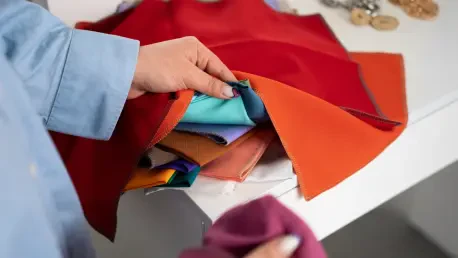The global textile industry is undergoing a seismic shift as ethical sourcing gains traction in response to growing consumer awareness and regulatory scrutiny. Worth an impressive $1.5 trillion, this industry has long been criticized for its lack of transparency, along with its detrimental environmental and social impacts. Faced with mounting pressure from consumers and stringent government regulations, companies are increasingly adopting ethical sourcing practices. These practices, which transcend mere compliance requirements, demand full transparency, fair wages, and responsible environmental stewardship. Ethical sourcing is not a transient trend but a fundamental transformation reshaping how textiles are produced and marketed globally.
The Demand for Reform in the Textile Industry
The demand for ethical sourcing comes as a response to the textile industry’s historical reliance on inexpensive labor and unsustainable practices. This has often resulted in significant human rights abuses and environmental destruction. A stark example is the 2013 Rana Plaza disaster in Bangladesh, which resulted in the deaths of over 1,100 garment workers and underscored the dire need for comprehensive industry reform. The fashion industry is identified as a major environmental polluter, second only to the oil industry, contributing to plastic pollution, carbon emissions, and water contamination. Conventional cotton farming is particularly resource-intensive, requiring substantial water use and pesticide applications, while synthetic fibers like polyester release harmful microplastics into oceans. Textile dyeing is a massive pollutant as well, responsible for 20% of global industrial water pollution, according to the World Bank.
Increasing awareness of these issues has fueled demands from consumers, governments, and advocacy groups for significant changes within the industry. Ethical sourcing has emerged as a viable alternative, offering a path toward greater sustainability and social responsibility. Fashion brands are compelled to address these concerns, implementing practices that prioritize the environment and ethical labor practices in their supply chains. As consumer preferences evolve towards more sustainable and ethical production, driven by values held by Gen Z and Millennials, fashion brands must rise to meet these changing expectations or risk obsolescence.
Technological Innovations and Consumer Expectations
As consumer expectations evolve, transparency becomes a core aspect of ethical sourcing, with modern technology playing a pivotal role. Blockchain technology has revolutionized how consumers interact with brands, allowing them to trace garments from raw material to retail. This transparency ensures responsible sourcing and the ethical treatment of workers. Companies like Patagonia and Everlane have leveraged this technology, fostering consumer trust by providing insight into their production processes. Further technological advances, including artificial intelligence and the Internet of Things, are employed to monitor factory conditions in real time. These innovations enable brands to identify and address environmental hazards and labor violations before escalating into broader issues, moving beyond traditional reactive audits.
Brands transitioning to ethical sourcing benefit significantly, experiencing enhanced reputations and stable financial futures. Companies implementing sustainable materials and ethical labor practices tend to observe higher customer loyalty and brand advocacy. According to a 2022 Cone Communications survey, a staggering 87% of consumers expressed likelihood to support brands that contribute positively to social and environmental causes. Such loyalty in today’s fiercely competitive market translates into increased sales and unique market positioning, making ethical sourcing a crucial component of modern brand strategy. Brands that ignore these trends risk losing consumer trust and market share to competitors who embrace ethical sourcing.
Regulatory Compliance and Industry Challenges
Regulation compliance is another critical driver for brands pivoting towards ethical sourcing. Increasingly stringent environmental and labor laws are being enacted worldwide to address sustainability issues. In the United States, the Uyghur Forced Labor Prevention Act bans imports linked to forced labor from China’s Xinjiang province. Similarly, the European Union’s Corporate Sustainability Reporting Directive mandates detailed supply chain disclosures. Non-compliance with these regulations can result in significant legal challenges, damage to brand reputations, and potential exclusion from major markets. Ethical sourcing offers a path for brands to navigate these complex regulations, ensuring adherence to international labor and environmental standards.
Despite the advantages, the shift to ethical sourcing presents challenges, with cost being a primary concern. Incorporating ethical labor and sustainable materials can increase production costs, ranging from 10% to 30%. This poses particular difficulty for fast fashion brands that thrive on offering low-cost, high-volume products. The complexity of global supply chains also complicates the transition, as textile production involves multiple tiers of suppliers spanning various countries. A study by Fashion Revolution in 2023 found that only 12% of major fashion brands disclose complete supplier lists, allowing unethical practices to persist unchecked. Additionally, the matter of greenwashing hampers genuine efforts, with some companies making unfounded claims of sustainability to attract ethically conscious consumers while failing to implement meaningful changes. This erodes consumer confidence and highlights the necessity for standardized, third-party certification to authenticate ethical practices.
The Future of Ethical Sourcing in Textiles
Looking towards the future, ethical sourcing in the textile industry is being shaped by several key trends. Circular economy models, technological advancements, and industry collaborations are pivotal in this new landscape. Blockchain technology is revolutionizing supply chain transparency, offering immutable records of production stages. Firms like VeChain and Provenance utilize this technology, providing consumers with verifiable details about product origins and ensuring authenticity and ethical integrity. In parallel, artificial intelligence and the Internet of Things are being employed to monitor global factory conditions in real time. These technologies facilitate proactive measures, allowing brands to address environmental and labor concerns before escalating into systemic problems.
Circular fashion represents another emergent movement, with brands like Adidas and The North Face spearheading take-back programs for recycling old garments. Efforts also include rental and subscription services, which extend product lifespans and reduce new apparel demand. Adoption of these models demonstrates the industry’s commitment to minimizing environmental impact while catering to ethical consumer demands. Industry standardization is also crucial, fostering collaboration among major brands to achieve shared sustainability goals. This collaborative spirit is exemplified by initiatives like the Fashion Pact and the Sustainable Apparel Coalition, which facilitate greater accountability and systemic change throughout the sector. Through these efforts, the textile industry looks toward a more ethical and sustainable horizon, responding to both consumer expectations and regulatory demands.
Embracing an Ethical and Sustainable Future
The global textile industry, valued at an impressive $1.5 trillion, is experiencing a significant transformation as ethical sourcing becomes increasingly important. This shift is driven by rising consumer awareness and stricter regulatory oversight. For years, the industry has faced criticism for its lack of transparency and harmful environmental and social effects. As a result, companies are facing growing pressure from both informed consumers and tougher government regulations, prompting them to adopt ethical sourcing practices. These practices go beyond merely meeting compliance requirements; they emphasize full transparency, ensuring that workers receive fair wages, and promoting responsible management of environmental resources. Ethical sourcing represents more than just a passing trend—it’s a fundamental shift in how textiles are produced and marketed globally. This transformation is laying the foundation for a more sustainable future in fashion, where the well-being of people and the planet is prioritized alongside profitability.









